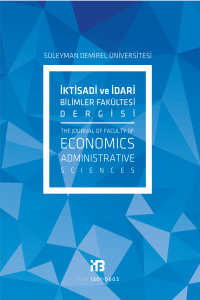KURUMSAL YÖNETİM ENDEKSİ VE KATILIM 30 ENDEKSİ İLE BİST 50 ENDEKSİ’NİN PERFORMANSLARININ DEĞERLENDİRİLMESİ
Katılım bankacılığı; İslami prensiplerine uygun olarak faaliyetlerini gerçekleştiren bir bankacılık modelidir. Katılım bankaları ilkelerine göre düzenlenen katılım endeksleri dünya çapında uzun yıllardır var olmasına rağmen ülkemizde 2011 yılından bugüne hızlı bir büyüme göstermiştir. Son dönemlerde öne çıkan bir diğer endeks kurumsal yönetim endeksidir. Gerek katılım endeksi gerekse kurumsal yönetim endeksi BİST’de ki diğer sektör endekslerinden farklı olarak daha homojen olan endekslerdir. Bu açıdan, bu çalışmada Kurumsal Yönetim Endeksi ve İslami prensiplere uygun hisse senetlerinden oluşan katılım 30 Endeksi ile BİST 50 Endeksi’nin 10 Ocak 2011 ile 22 Aralık 2016 tarihleri arasındaki risk ve getiri karakterleri incelenmiştir. Çalışma dönemi üç artan ve dört azalan piyasa dönemi olmak üzere yedi alt döneme ayrılmıştır.
Anahtar Kelimeler:
Kurumsal Yönetim Endeksi, Katılım Endeksi, Endeks Performansı
EVALUATION OF PERFORMANCE OF PARTICIPATION 30 INDEX AND CORPORATE GOVERNANCE BY BIST 50 INDEX
Participation (Islamic) banking is a banking model which activities are carried out in accordance with Islamic principles. Although participation indexes, which are regulated based on the principles of participation banks have been around worldwide for many years, they have shown rapid growth performance since 2011 in Turkey. Another index that has recently come into prominence is the corporate governance index. Both the participation index and the corporate governance index are indices that are more homogeneous than the other sector indices in Istanbul Stock Exchange. From this point, this study examines the risk and return characteristics of Corporate Governance index and Participation 30 Index which is comprising suitable stocks to Islamic principles in Turkey an BIST 50 Index during the period 10th January 2011 to 22th December 2016.
___
- ABBES, M. B. (2012) Risk and return of Islamic and conventional indices. International Journal of Euro-Mediterranean Studies, 5(1), 1-23.
- ALBAITY, M. ve Ahmad, R. (2008) Performance of Syariah and composite indices: Evidence from Bursa Malaysia. Asian Academy of Management Journal of Accounting and Finance, 4(1), 23-43.
- Al-KHAZALI, O., Lean, H. H., & Samet, A. (2014). Do Islamic stock indexes outperform conventional stock indexes? A stochastic dominance approach. Pacific-Basin Finance Journal, 28, 29-46.
- ASUTAY, M. ve Hendranastiti, N. D. (2015) Comparison of portfolio selection and performance: shari’ah-compliant and socially responsible investment portfolios. Indonesian Capital Market Review.
- ATTA, H. (2000) Ethical Rewards. Published Master’s Thesis, Durham University, UK.
- BARNES, J. (2012) A Values-Based Value Investor, CFA Magazine, May-June. Borsa İstanbul, http://www.borsaistanbul.com/endeksler/bist-pay-endeksleri/kurumsal-yonetim-endeksi , (12.08.2016)
- DAĞLI, H., Ayaydin, H. ve Eyüboğlu, K. (2010). Kurumsal Yönetim Endeksi Performans Değerlendirmesi: Türkiye Örneği. Journal of Accounting & Finance, (48).
- DHARANI, M. ve Natarajan, P. (2011) Equanimity of risk and return relationship between Shariah index and general index in India, Journal of Economics and Behavioral Studies, Vol. 2, No. 5, pp. 213-222.
- El KHAMLICHI, A., Sarkar, K., Arouri, M. ve Teulon, F. (2014). Are Islamic equity indices more efficient than their conventional counterparts? Evidence from major global index families. Journal of Applied Business Research, 30(4), 1137.
- HASSAN, K. ve Girard, E. (2011) Faith-Based Ethical Investing: The Case of Dow Jones Islamic Indexes, Networks Financial Institute, Indiana State Uni. , 2011-WP-06.
- HO, C. S. F., Rahman, N. A. A., Yusuf, N. H. M. ve Zamzamin, Z. (2014) Performance of global Islamic versus conventional share indices: International evidence. Pacific-Basin Finance Journal, 28, 110-121.
- HUSSEIN, K. (2004) Ethical investment: empirical evidence from FTSE Islamic index, Islamic Economic Studies, 12(1), 21-40.
- JAWADI, F., Jawadi, N. ve Louhichi, W. (2014) Conventional and Islamic stock price performance: An empirical investigation. International Economics, 137, 73-87.
- JENSEN, M. C. (1968) The Performance of Mutual Funds in the Period 1945-1964, The Journal of Finance , 23 (2), pp: 389-416.
- KAHRAMAN, A. (2013) KPMG Gündem Dergisi, 56-58.
- KORKMAZ, T. ve Uyguntürk, H. (2007) Türkiye'deki Emeklilik Fonlarının Performans Ölçümü ve Fon Yöneticilerinin Zamanlama Yeteneği, Akdeniz Üniversitesi İktisadi ve İdari Bilimler Fakültesi Dergisi, Sayı 14, pp. 66–93.
- RANA, M. E. ve Akhter, W. (2015) Performance of Islamic and conventional stock indices: empirical evidence from an emerging economy. Financial Innovation, 1(1), 15.
- SALDANLI, A. (2012) Kurumsal Yönetim Endeks Performansının Analizi, The International Journal of Economic and Social Research, Vol:8, Year:8, Special Issue,8:137-154.
- SEÇME, O., Aksoy, M. ve Uysal, Ö. (2016) Katılım Endeksi Getiri, Performans ve Oynaklığının Karşılaştırmalı Analizi. Journal of Accounting & Finance, (72).
- SHARPE, W. F. (1966) Mutual Fund Performance, The Journal of Business, 39 (No: 1, Part 2: Supplement on Security Prices), PP: 119-138.
- SPK (2016), SPK Faaliyet Raporu 2015, Ankara.
- TREYNOR, J. L. (1965) How to Rate Management of Investment Funds, The Journal of Business , 43 (1), 63-75.
- ÜLEV, S. ve Özdemir, M. (2015) Katılım Endeksi ile Piyasa Faiz Oranları Arasındaki Nedensellik İlişkisi, International Congress on Islamic Economics and Finance, 21-23 October 2015, Sakarya/TURKEY, 47-54.
- YILDIZ, S. B. (2015) Katılım 30 Endeksi İle BİST 100 Endeksi’nin Performanslarının Değerlendirilmesi.
- ISSN: 1301-0603
- Yayın Aralığı: Yılda 3 Sayı
- Başlangıç: 1996
- Yayıncı: Süleyman Demirel Üniversitesi
Sayıdaki Diğer Makaleler
PSİKOLOJİK YILDIRMANIN ÖRGÜTSEL STRESE VE ÇALIŞAN DAVRANIŞINA ETKİSİ: ANTALYA ALAN ARAŞTIRMASI
YENİ BÜYÜKŞEHİR BELEDİYE SİSTEMİNE YÖNELİK KAMUOYU ALGISI VE MEMNUNİYET DÜZEYİ: ALANYA ÖRNEĞİ
Mehmet AKTEL, Ümmühan KAYGISIZ
MEVDUAT BANKASI SEÇİMİ SÜRECİNDE TOPSIS VE ELECTRE YÖNTEMLERİNİN KULLANILMASI
Damla YALÇINER, Meltem KARAATLI
USTA OLMAK MI DİĞERLERİNDEN DAHA İYİ OLMAK MI? ÇOKLU BAŞARI HEDEFLERİNE DAİR TEORİK ÇERÇEVE
Tuğba ERHAN, İlker ÇARIKÇI, Ali ALPARSLAN
MORTGAGE PİYASASI VE PARA POLİTİKASININ KONUT FİYATLARINA ETKİSİ: TÜRKİYE ÜZERİNE BİR UYGULAMA
